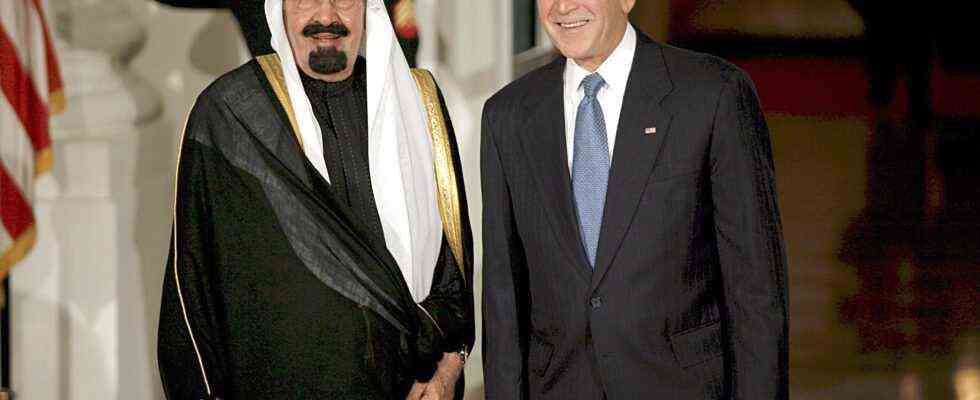As of: 09/08/2021 4:36 p.m.
The vast majority of the attackers on September 11, 2001 came from Saudi Arabia. And yet the country did not have to fear any consequences afterwards. Relatives of the victims of the attack are still asking all the louder for the reasons.
The question of what responsibility Saudi Arabia bears for the 9/11 attacks still preoccupies some Americans today. Take Terry Strada, for example. Her husband Tom was killed when the north tower of the World Trade Center in New York collapsed. “After 20 years, the Justice Department and the FBI are protecting the very country that created 15 of the 19 kidnappers – the Kingdom of Saudi Arabia,” she says.
Strada is standing with Democratic Party senators at an impromptu press conference at the foot of the Capitol Building in Washington DC in early August. They demand that papers previously classified as secret be published by September 11th:
We know that the kingdom has provided crucial support and funding for the al Qaeda terrorist organization. And there is evidence that Saudi agents the country sent to the US helped some, if not all, of the 19 kidnappers involved in the attack. ”
Mind games after the attacks
Why did the US never break with Saudi Arabia as a result of the terrorist attacks? David Rundell says a few within the Bush administration considered restricting relations in 2001. During his active time, the diplomat served in the US embassy in Riyadh, but also in the consulates in Jeddah and Dhahran.
Some people in Washington were annoyed at the time and had demanded that Saudis no longer issue a visa for the United States, that embassies or consulates be closed, that they no longer train Saudi officers and that they no longer sell weapons to the Saudis.
In the end, however, the votes in the administration prevailed, explains Rundell, who considered the relationship with Saudi Arabia to be indispensable.
Also an episode from 1979
To explain the decision, one has to go back to 1979, says Paul Salem of the Institute for the Near and Middle East, a policy consultancy in Washington DC – the year the Soviet Union invaded Afghanistan. Saudi Arabia, Pakistan and the USA began to support radical Islamists in their fight against the communists.
At the time, Salem recalls, the United States did not see Islamist extremists as a threat: “Communists were the threat to them. They later found that it was a terrible misjudgment.”
In 1979 the Soviet Union invaded Afghanistan. Then the US financed Islamic rebels – aid with far-reaching consequences.
Image: AP
Connections that are too close
But for Saudi Arabia, which also supported the rebels, it was already too late to cut ties: According to the Americans, the royal family was even deeper into it. However, some US diplomats like Rundell tend to defend Saudi Arabia’s leadership.
It was not that they consciously supported terrorists. But while the Saudi leadership supported the Taliban and other fundamentalist groups financially, it controlled them very negligently. As a result: “People could do what they wanted, and some of them were up to bad things.”
Washington and Riyadh in the same boat?
Salem says the stated goal of Al Qaeda and Osama bin Laden was to overthrow the Saud royal family. There was also a good relationship between the family of US President Bush and the Saud house. Finally, in Washington 2001, the impression prevailed that they were in the same boat as the leadership in Riyadh.
But there are more reasons why Americans have never seriously considered breaking relationships: their own interests. Salem points out that the bilateral relations between the two countries go back a long way: “They go back to the 1940s and at first only revolved around oil.”
Today’s similarities
Today it is hardly about oil imports for America, but about Saudi Arabia’s ability to influence the oil price worldwide with its large production volumes. The five US military bases in the country as well as in neighboring Qatar and Bahrain are of strategic interest. And finally, the Saudis in the United States buy weapons and armaments for tens of billions of dollars.
Most recently, the murder of the Saudi journalist Jamal Khashoggi on behalf of or in the knowledge of the Saudi Crown Prince Mohammed Bin Salman sobered any hope of a fresh start. US President Joe Biden promised in the election campaign to declare Saudi Arabia a leper.
After his election, Biden made a distinction in an interview with the television station “ABC” between those involved and the Crown Prince. This is what “Realpolitik” sounds like:
I made it clear to the king, his father, that things will change. We hold everyone accountable who was involved in the act. But not the Crown Prince, because I am not aware that in the case of allies we have ever gone to an incumbent head of state and punished him. “
Struggle for a law
In a video call from her daughter’s home in North Carolina, Terry Strada explains the next steps. A law is to force the Justice Department to publish new documents on the participation of the Saudis. She was still confident, and she had to be, to continue her struggle.
And she hoped that the events of 20 years ago would “rebuild” the relationship with Saudi Arabia – not destroy it: “It is very important to reveal the role the kingdom plays in financing terrorism. More important than today ever before looking at the events in Afghanistan. ”
Unlike experts in Washington, Strada believes as a bereaved that Saudi Arabia’s support for terrorists has never stopped. The US has not even clarified how money has flowed in the past.

